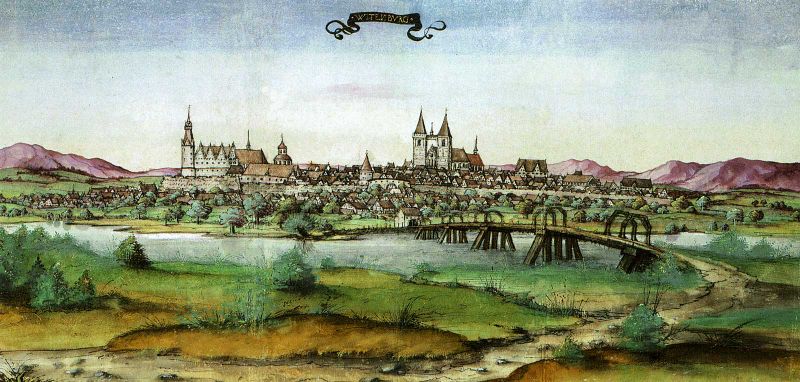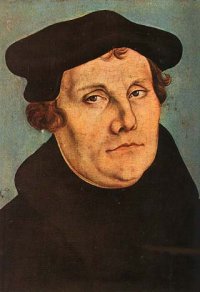by Lawrence MacLachlan

Famous Trials: The Trial of Martin Luther
Luther Background:
Martin Luther was a German theologian and a major leader of the Protestant Reformation. He is sometimes called the father of Protestantism.
Luther at the Imperial Diet of Worms 1521
Luther, who through the church's excommunication was practically declared a heretic, was invited to Worms by the Emperor who had been pressured by a few princes. Both the church and Emperor wanted Luther to recant his teachings while he was there. The princes who supported Luther hoped that through the forthcoming events the political power of Rome over Germany would be weakened. "Unless I am convinced by Scripture and plain reason - I do not accept the authority of the popes and councils, for they have contradicted each other - my conscience is captive to the Word of God. I cannot and I will not recant anything for to go against conscience is neither right nor safe. God help me. Amen."
At length Luther stood before the council. The emperor occupied the throne. He was surrounded by the most illustrious personages in the empire. Never had any man appeared in the presence of a more imposing assembly than that before which Martin Luther was to answer for his faith. "This appearance was of itself a signal victory over the papacy. The pope had condemned the man, and he was now standing before a tribunal which, by this very act, set itself above the pope. The pope had laid him under an interdict, and cut him off from all human society; and yet he was summoned in respectful language, and received before the most august assembly in the world. The pope had condemned him to perpetual silence, and he was now about to speak before thousands of attentive hearers drawn together from the farthest parts of Christendom. An immense revolution had thus been effected by Luther's instrumentality. Rome was already descending from her throne, and it was the voice of a monk that caused this humiliation."--
Martin Luther and the Reformation
Confession of particular sins seemed inadequate for man's plight. The whole man needed release from total inner corruption. Piece by piece and doubt by doubt, Luther came to view the all-pervasiveness of sin and the only solution that could satisfy his wounded conscience. Since man was too deeply sunk in sin to do anything for his own salvation, he had to be saved, or justified, by faith alone. Luther's thoughts tumbled out of the classroom into the marketplace in 1517. Luther nailed 95 propositions (or theses) in Latin on the door of the castle church in Wittenburg as an open invitation to a debate on their merits. They began with a popular attack on the venality of Rome, passed through the doubts as to the Pope's right to remit punishment inflicted by God, and finished by asserting that nothing but contrition could remit spiritual guilt and nothing else was necessary.
Selected Works of Martin Luther 1483 - 1546
Briefwechsel by Martin Luther (1903)(primary source in German from Google books)
The Martin Luther Trail in Germany (with maps)
Project Wittenberg is home to works by and about Martin Luther and other Lutherans. Here you will find all manner of texts from short quotations to commentaries, hymns to statements of faith, theological treatises to biographies, and links to other places where words and images from the history of Lutheranism live.

Lutheranism was founded by Martin Luther, a German monk and professor who has been called the "Father of the Reformation." In 1517, he famously protested against the Catholic Church's sale of indulgences. In his sermons and writings, Luther stressed the doctrine of justification by faith alone and the authority of scripture alone.
Wittenberg's All Saints' Church, more commonly known as the Schlosskirche (Castle Church), is where Luther famously nailed his 95 Theses in 1517. The church contains the tombs of Luther, Melanchthon and Frederick the Wise.
Bibliography
Bainton, Roland H., "Here I Stand: The Life of Martin Luther," Meridian Publishing, New York, 1955.
Fulbrook, Mary, "A Concise History of Germany," Cambridge University Press, Cambridge, 1992.
Gritsch, Eric w., "Lutheranism," Fortress Press, Minneapolis, 1994
Manchester, William, "A World Lit only by Fire," Little, Brown and Company, Boston, 1993.
Tuchman, Barbara W., "The March of Folly," Ballantine Books, New York, 1984
Additional Reading:
Atkinson, James. “The Trial of Luther”, Stein and Day, New York, 1971.
Atkinson, Mary. “Luther on Trial: the Proceedings Against Martin Luther from a Legal Viewpoint”, Northwestern University School of Law, 1967
Hillerbrand, Hans Joachim. “The Protestant Reformation”, Harper & Row, New York, 1968
Olivier, Daniel. “The Trial of Luther” translated by John Tonkin, Mowbrays, London, 1978.
Stella, Allyson. “Martin Luther: a Recreation of his 1521 Trial for Heresy”. Interact, Lakeside, CA., 1991
Video: The Trial of Martin Luther
Most Evangelicals who celebrate Reformation Day do so on October 31, which is the day that Martin Luther nailed his famous 95 theses to the Castle Church door in Wittenburg in 1517. The debate that ensued led to a full outbreak of reformation and to Luther's trial at the Diet of Worms in 1521. So, I offer this video from GodTube as a reminder of this important occasion in the history of the Church. The clip is taken from the 1953 film, Martin Luther, in which Luther was wonderfully portrayed by Niall MacGinnis. I love the way the film employs Luther's famous hymn, A Mighty Fortress is Our God, in the background. Posted by Keith Throop.
